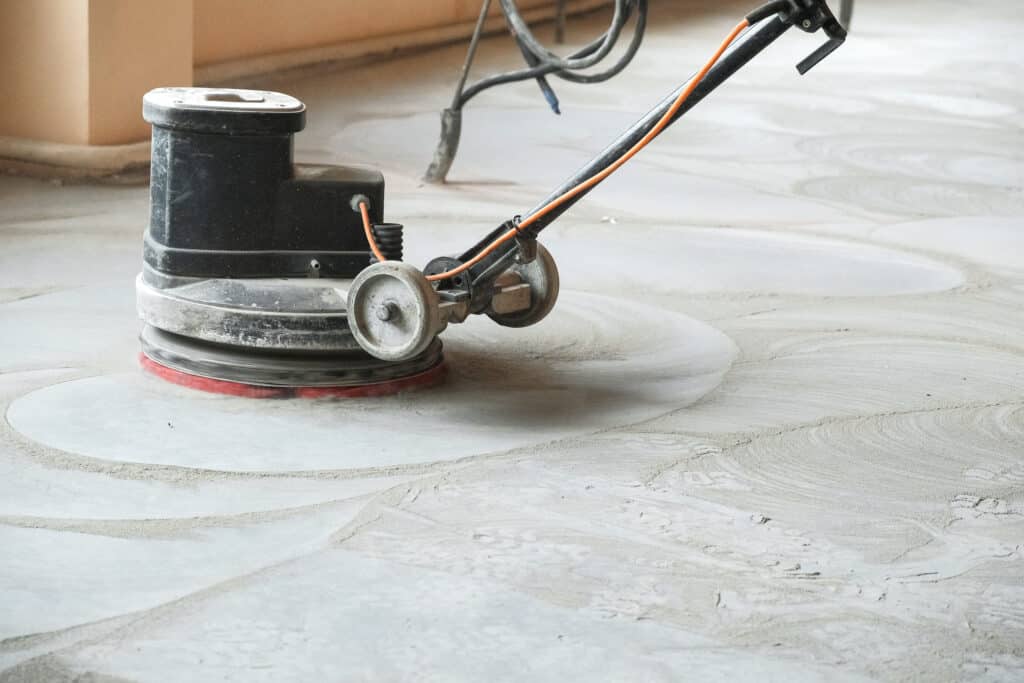Garage floor coatings of vinyl or epoxy are a preventative measure that strengthens and protects concrete floors. Floor coatings offer a lot of variety and can be applied to a property owner’s specification when it comes to color, material, and thickness. Sometimes, however, removing garage floor coatings becomes necessary. For example, if a property changes ownership, the new owner may not share the previous one’s preferences.
When changes to a floor coating need to be made, professional coating removal may also extend concrete’s durability and improve the look of a given space. At Garage Floor Masters, we offer impressive results whether you need your floor coating applied or removed.
Why Would You Want to Remove a Garage Floor Coating?
Garage floor coatings protect concrete surfaces and improve the appearance of a floor. They also extend the life of a concrete floor and add value to a property, so why would you want to remove them? A few situations necessitate the need for change. If you lay a floor coating yourself and the finished product doesn’t meet your expectations, you may have to resort to pulling it up again.
Removing garage floor coatings presents more than a little difficulty because epoxy resins bind with the surface of the concrete. We certainly don’t recommend handling the removal yourself. Professional floor coating removal is a much quicker and less disruptive process. In fact, if a coating is applied incorrectly or there are any flaws in the installation, removal will need to be performed by a professional.
Removing Garage Floor Coatings
Epoxy garage floor coatings are designed to be enduring and to hold up well under wear and tear. This can make them difficult to remove. Removing garage floor coatings can be time-consuming and labor-intensive, especially depending on the size of your garage floor. Though the process is difficult, floor coatings can be removed with a combination of elbow grease and chemical means. 
Scraping and Solvents
With a little determination, removing garage floor coatings can be managed by scraping and a little acetone or paint thinner. Using a tungsten blade scraper with a long handle, homeowners can remove floor coating residue that has been weakened with a corrosive solvent. This method is not for the faint of heart. The chemical reaction between solvent and epoxy produces noxious fumes, so wearing protective gear is a must.
Using a mop, cover the coated floor with a solvent that is specific to the kind of floor covering on your property. Follow all dilution instructions to the letter to avoid injury or damage to the concrete itself. When the coating pulls away from the concrete, scrape it away. The process is generally effective, but the process may need to be repeated several times to ensure all remnants of the floor coating are removed.
Grinding
Removing garage floor coatings can also be managed with a floor grinder (similar to a sander, though designed to remove much sterner stuff). Choose your unit carefully; some models are fueled by propane while others run on electricity. You will also need some specific tools for grinding away coating material in corners. Manufacturers provide edgers or edging attachments for the purpose.
Grinding floor coatings away is a process a little more finessed than scraping, though it is still important to wear protective clothing during the process. Diamond pads allow users to determine how deeply the machine cuts into the coating’s surface. Lower grit ratings (20-80) are better at deep cuts while higher numbers (nearer 100) are better for detailing and smoothing.
No matter which pads are on the machine, grinding down a garage floor coating requires delicate handling to avoid damaging the concrete beneath. Grind in one direction for an even surface, removing the debris that flies off as you work. When all the grinding is completed, the concrete underneath should be thoroughly cleaned with water and soap.
Restoring a Floor Coating After Removal
The process to restore a garage floor coating after one has been removed is dependent on whether the removal was partial or complete. Because installing a floor coating—especially after one has been removed—is a nuanced process, it is best to call in the cavalry. Let a professional contractor do the job.
An experienced professional will make sure all of the previous coating has been cleared away and that the concrete is prepared for a new coat (a process that can require acid etching). If you are thinking about removing garage floor coatings or restoring some that have been removed, give us a call at Garage Floor Masters.






